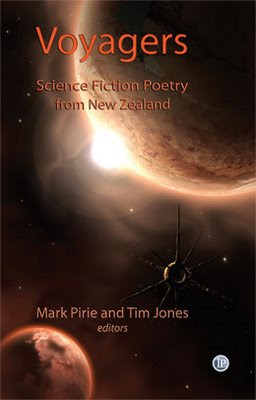Tim says: This week, I’ve chosen an anthologised poem that is also part of a novel. Confused? You won’t be…
A Tingling Catch
“Baxter Between the Wickets” is one of several poems by Michael O’Leary in the excellent anthology A Tingling Catch: A Century of New Zealand Cricket Poems 1864-2009, edited by Mark Pirie, which was launched at the Long Room of the Basin Reserve, the test cricket ground in Wellington, on Sunday. I had the great pleasure of reading my poem Swing at the launch.
I was going to spend some time telling you how good A Tingling Catch is – starting with this cover painting of the Basin Reserve by Jocelyn Galsworthy, who, I think it’s safe to say, is the world’s leading cricket artist, and continuing with the selection of poems (mine, of course, modestly excluded!).
But now I don’t have to say how good it is, because Graham Beattie has done so admirably on Beattie’s Book Blog.
Out of It
So let’s move on to the book from which this poem is extracted. Out of It (Earl of Seacliff Art Workshop, 1987) is presently out of print, but Michael is planning to reprint it in 2011 – and if you can’t wait till then, the entire text of the novel is available online. I read Out of It recently, and enjoyed it very much.
The frame of this novel-with-poems is a cricket match at Eden Park between the “Out of It XI” and New Zealand. The two XIs are:
NEW ZEALAND OUT OF IT
1) Dipak Patel Jimi Hendrix
2) Ken Rutherford Monk Lewis
3) John Wright (V.C.) Te Rauparaha (C)
4) Martin Crowe Oscar Wilde
5) Jeff Crowe Jim Morrison
6) Jeremy Coney (C) Alfred Jarry
7) Richard Hadlee Janice Joplin
8) Ian Smith Bob Marley (V.C.)
9) John Bracewell Herman Goering
10) Lance Cairns Lord Byron
11) Ewen Chatfield James Joyce
12TH MEN
12) Martin Sneddon James K. Baxter
Baxter, then, is on the field as a runner for an injured Jim Morrison, and “Baxter Between the Wickets” represents his thoughts as he is called through for three runs by Te Rauparaha, the “Out of It XI” captain. Michael tells me that the “Colin” of the poem is Colin Durning, an old friend of both James K. Baxter and Michael O’Leary.
Baxter Between the Wickets
Morrison hit Chatfield down to deep cover and sent Hemi, grey-hair, grey-beard flying like sails, off for a run. The chief ran like the wind so that Baxter, who was obviously the least fit of the two, was stretched to the limit but made it home for three runs.
“Ha Ha! I bet that got the old cogs in the wheels turning, John. I thought the old guru of the New Jerusalem was struggling a bit there.”
“Yes Dennis, but he made it and his thinking must be matching his physical triumph at this moment.”
Man! He has called me again
From that place inside me – the unworthy
Servant! He called me three times
When I, in my mortal dung heap mind
Would have settled for one
And all the lice in my beard jumped out
For fear of this terrible century’s (looming) speed
Who will torment me now, at night
Who will remind me of Him –
And sin! Which this mad old devil
Commits with every eyelid bat, every thought
Kei te Rangitira o te ngati porangi, ahau –
I stand at the end of the crease Colin
Knowing He only wants what He knows I can do
This poem, and the text which immediately precedes it, is taken with permission from Michael O’Leary’s 1987 novel Out of It.
Finally, this poem also ties back to my post from early October responding to Scott Baxter’s query about the influence of James K. Baxter on New Zealand poetry. Here, that influence is alive and well, if not incredibly happy at having been called through for more than a single!
You can check out all of the Tuesday Poems at the Tuesday Poem Blog.



